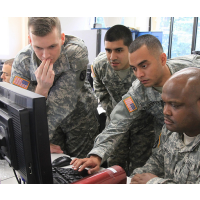National Guard Turns to Defending Nation from Cyberattacks
 Virginia National Guard soldiers conducting cyber warfare exercise (photo: Cotton Puryear, VA National Guard Public Affairs)
Virginia National Guard soldiers conducting cyber warfare exercise (photo: Cotton Puryear, VA National Guard Public Affairs)
Defending the nation against cyberattacks has become a priority of the U.S. military, including the “weekend warrior.”
In addition to the Army devoting resources to defend against, and possibly initiate, cyber assault, the National Guard wants in on the action.
The Army, in fact, welcomes the Guard’s participation, and has proposed funding 390 positions in 10 new “Cyber Protection Teams” within the Guard. Last March, eight U.S. senators introduced a bill to establish such teams.
“The Cyber Warrior Act will ensure that in the first hours and days after a devastating cyberattack, our local responders will have the same support of the National Guard for response and recovery that they do when a hurricane strikes,” the bill’s co-sponsor, Christopher Coons (D-Delaware), stated.
The state of Washington has been the first to move forward in this area, and a number of National Guardsmen have already begun training with the active-duty troops of the U.S. Cyber Command (CYBERCOM), according to National Guard Bureau Chief Gen. Frank Grass.
But not everyone inside the Guard is keen on the idea of reservists joining the anti-hacker fight.
One senior Guard official wrote in an email obtained by Breaking Defense that adjutants general and various commanders shouldn’t push the issue.
“We have entered a new normal called sequestration,” the senior official’s email stated. “To fund ‘excess’ or ill-defined requirements out of hide is impossible. I continue to be concerned with further investments in Cyber and ISR [intelligence, surveillance, and reconnaissance] without definitive requirements documentation from COCOM/MAJCOMs [Combatant Commands and Major Commands]. In my opinion this posture could put [Guard] force structure at risk depending on strategic choices being made by DoD leaders.”
The idea of the Guard turning into cyber warriors pleases some in the intelligence community, like outgoing National Security Agency chief General Keith Alexander, who also oversaw CYBERCOM.
“The Guard can play a huge role,” Alexander told Congress last year. “There’s two key things that they can do. First… it gives us additional capacity that we may need in a cyber conflict. The second part is, it also provides us an ability to work with the states.”
State cyber networks are quite vulnerable. Seventy percent of states’ chief information security officers acknowledged that their state has weathered a security breach, according to a 2012 survey (pdf). Only 24% of those officers said they felt “very confident” that their state networks were secure against external threats.
“As the nation develops resiliency to cyberattacks, the Guard should be mobilized to support federal and state efforts to protect networks and respond to incidents,” Colorado Gov. John Hickenlooper said this month in his State of the States speech. “While the federal government seeks to clarify how it will work with the private sector and states to better secure cyberspace, states are already moving forward to develop and implement new cyberpolicies to protect their economies and ensure public safety.”
The Department of Defense will consult with governors across the U.S. in its assessment of how the Guard can support states’ cybersecurity needs, according to a requirement in the National Defense Authorization Act that President Obama signed into law in December.
- Danny Biederman, Noel Brinkerhoff
To Learn More:
National Guard Fights For Cyber Role In 2015 Budget (by Sydney Freedberg Jr., Breaking Defense)
The National Guard Takes on Hackers (by Melissa Maynard, Stateline)
National Guard Is Eager To Expand Cyber Capabilities (by Philip Ewing, Politico)
National Guard Added to Joint Chiefs of Staff on 375th Anniversary (by Noel Brinkerhoff, AllGov)
- Top Stories
- Unusual News
- Where is the Money Going?
- Controversies
- U.S. and the World
- Appointments and Resignations
- Latest News
- Trump Orders ICE and Border Patrol to Kill More Protestors
- Trump Renames National Football League National Trump League
- Trump to Stop Deportations If…
- Trump Denounces World Series
- What If China Invaded the United States?






Comments